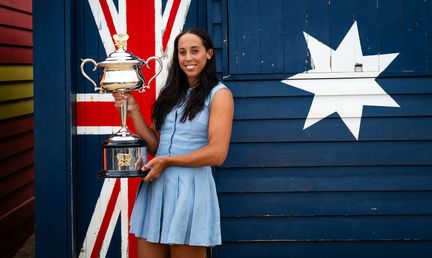They are the Nos.1 and 2 players in the world, but that alone doesn’t grant them an invitation to join the All England Lawn Tennis and Croquet Club.
Iga Swiatek and Coco Gauff have won two of the past three Grand Slam singles titles but, beginning next week, they step onto the lush lawns of Wimbledon without knowing the feeling of being a champion there.
That is something they’d both like to change as this fortnight looms. For that to happen, they’ll have to alter the approaches that have worked so well on other surfaces.
On Saturday, Swiatek told reporters she didn’t feel like an underdog.
Wimbledon: Draw | Scores | Order of play
“But for sure I feel like I really need to focus on just the process of being a better player here,” she said at media day. “Learning how to play the best kind of tennis here on grass. So that’s what I'm going to do.”
Gauff is encouraged by the fact there have been seven different champions here in the past seven years, something she noticed looking at the champions wall at the Aorangi practice facility.
“It was a lot of different names, which is something kind of new, post Serena, post a lot of the legends,” Gauff said. “I think for me it just shows there’s a lot of talent on the women’s tour and it’s anybody’s game.”
Both Swiatek and Gauff have the polish and the pedigree to succeed here. But in some ways, talent obscures their relative lack of experience on a sometimes quirky surface. Swiatek, 23, and Gauff, 20, are in fact the youngest Top 2 seeds in Wimbledon women’s singles since 2003 -- Serena Williams and Kim Clijsters.
Taylor Swift gave @iga_swiatek a note at her concert. 🥹💜 pic.twitter.com/688GLvOTH8
— Tennis Channel (@TennisChannel) June 14, 2024
They are both more comfortable on clay and hard courts. Swiatek is a four-time Roland Garros champion, and Gauff won last year’s US Open. Swiatek is 9-4 at Wimbledon, while Gauff is 8-4. That’s a very small sample size, but in terms of win percentage, it is their most challenging surface. Neither player has been past the quarterfinals. A big factor in that is their general lack of familiarity with grass.
But that doesn’t mean it always has to be that way.
Swiatek, who meets Sofia Kenin in a first-round match Tuesday, won her only junior major title at Wimbledon, in 2018. She went with the flow in that tournament and had yet to develop the “perfectionist” approach that works so flawlessly on clay.
“Overall, tennis is different on grass,” Swiatek said in Paris. “I’ll just see and I’ll work hard to play better there.”
After winning at Roland Garros for the first time in 2019, Swiatek lost her first match at Wimbledon. That was followed by a Round of 16 effort in 2021, a third-round in 2022 and last year’s quarterfinals, where she lost a three-set match to Elina Svitolina.
Martina Navratilova won a record nine titles at Wimbledon by serving and volleying and finishing points at net. Swiatek has the athletic ability to play well at net and has talked about adding that component to her game. But she won only five of 11 net points in the French Open final against Jasmine Paolini.
“You saw my one volley today that I was supposed get in -- and it went out,” Swiatek said afterward. “So this will, for sure, stay in my head.”
Coco Gauff is locked in 👊#Wimbledon | @CocoGauff pic.twitter.com/9soANrJIfw
— Wimbledon (@Wimbledon) June 25, 2024
Hopefully not, if she wants to venture into uncharted territory. Swiatek is riding some fine momentum, looking for her 18th consecutive victory in the first round of a Grand Slam -- and her 20th in a row this year.
Swiatek, who did not play a grass event coming in, arrived at Wimbledon early.
“At the beginning, for sure it was tricky,” she said. “Day after day I felt like I’m getting more rhythm, and I can really feel the ball better.
“Besides [working on the] serve, basically movement and stopping before getting a shot. I can’t really slide here. It wasn’t like we needed to focus on one specific thing. It’s overall just getting the feeling of the surface and making the small adjustments that is going to I think be enough.”
Five years ago, Wimbledon was where a 15-year-old Gauff first emerged to mainstream tennis fans as a phenomenon. She won three qualifying matches, then defeated Venus Williams in the first round on her way to the Round of 16, where she lost to eventual champion Simona Halep.
“Obviously everybody has high expectations, especially when you’re on tour at such a young age,” Gauff said. “Yeah, I think it would be both a surprise and satisfied with where I am right now.”
Gauff matched her inaugural effort in 2021, followed by a third-round appearance in 2022. Her worst result in four appearances -- a first-round loss to Kenin last year -- might have been the catalyst for her career-altering run last summer. Gauff won her first WTA Tour 500, 1000 and a Grand Slam, a run that helped her land the No.2 ranking this year. She’s Wimbledon’s youngest No.2 seed since Maria Sharapova in 2007.
On Tuesday, Gauff plays fellow American Caroline Dolehide on Monday in a first-round match. Gauff has spent a significant amount of time this year streamlining and strengthening her service motion. The result has been consistently higher service speeds -- sometimes in excess of 120 miles per hour -- leavened by more double faults. Gauff’s 53 doubles in the year’s two majors are the most by any other player.
Another area that can help her is coming to net more often. Gauff has played a lot of doubles in recent years and can crack a good volley.
Swiatek and Gauff are wonderful defenders who can win even if their offensive games are not clicking. They have the capacity for the kind of power that travels well on grass. Both women have been working on their serves to make them more efficient and, at the same time, more unreturnable.
The real trick? Serving bigger, moving forward when the inclination is to retreat and finishing points at net. Adjusting the buttoned-down games that play so well on clay, accepting a little more risk -- in order to capture greater rewards.
“That was also one of the goals,” Swiatek said, “to sometimes win by serving and making pressure with that. I managed to do that on other surfaces. Hopefully on this surface, it’s going to be also similar. Here it’s even more important to serve well the first serve.
“It seemed fine on practices, so I’m going to try it out on matches with some stress coming in and everything. Hopefully this progress that I’ve made is going to pay off.”
Gauff is well aware of the challenge ahead. Now that they are the two top-ranked players, she and Swiatek can’t meet until the final.
“There's tournaments where she’s on the same side or on the other side -- yeah, it doesn’t matter to me,” Gauff said. “If you want to win, you got to beat everybody, regardless of where they are in the draw.”


![[WC] Sorana Cirstea d. [8] Emma Navarro 7-6(5), 3-6, 7-5, Dubai R3 (3:01). Cirstea held on to notch the 24th Top 10 win of her career and reach the Dubai quarterfinals for the second straight season.](https://photoresources.wtatennis.com/photo-resources/2025/02/19/03a81ffa-191c-468a-8bc0-64546e4aa6e7/Sorana_Cirstea_-_Dubai_Duty_Free_Tennis_Championships_2025_-_Day_4-DSC_6614A.jpg?width=451&height=268)




